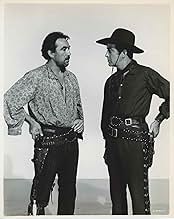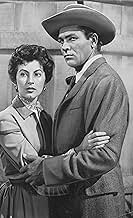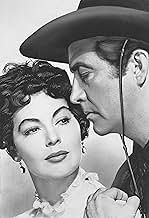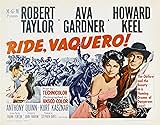CALIFICACIÓN DE IMDb
6.1/10
1.2 k
TU CALIFICACIÓN
Two outlaws, Rio and Esqueda, raised together as stepbrothers, have a showdown over the issue of whether to evict new settlers from their territory.Two outlaws, Rio and Esqueda, raised together as stepbrothers, have a showdown over the issue of whether to evict new settlers from their territory.Two outlaws, Rio and Esqueda, raised together as stepbrothers, have a showdown over the issue of whether to evict new settlers from their territory.
- Dirección
- Guionistas
- Elenco
Stanley Andrews
- Gen. Sheridan
- (sin créditos)
Arthur Berkeley
- Townsman
- (sin créditos)
Monte Blue
- Bartender
- (sin créditos)
Chet Brandenburg
- Townsman
- (sin créditos)
- Dirección
- Guionistas
- Todo el elenco y el equipo
- Producción, taquilla y más en IMDbPro
Opiniones destacadas
Even though it's not great, Quinn's performance is memorable and he really looks - and plays - the part.
I'm also intrigued by a couple of brief scenes in this film - a wide shot of a cavalry fort and the shot of mounted troopers riding out look awfully like they came from "She Wore A Yellow Ribbon". Did John Ford help the producers fill a couple of small gaps?
Howard Keel looked much more at home in "Pagan Love Song".
Robert Taylor looks like he wore his "Billy the Kid" duds again.
It's difficult to find a good, crisp copy of the film, but worth the effort.
I'm also intrigued by a couple of brief scenes in this film - a wide shot of a cavalry fort and the shot of mounted troopers riding out look awfully like they came from "She Wore A Yellow Ribbon". Did John Ford help the producers fill a couple of small gaps?
Howard Keel looked much more at home in "Pagan Love Song".
Robert Taylor looks like he wore his "Billy the Kid" duds again.
It's difficult to find a good, crisp copy of the film, but worth the effort.
Two outlaws , Rio (Robert Taylor) and Esqueda (Anthony Quinn) , raised together as step-brothers , are reluctant adversaries in this fiery Western . Esqueda's mother raised Rio as her own , but this mutual fraternity will be modified in arriving a strange couple whose vision from law and justice differs quite from them . As the brothers will have a showdown when Rio defends an untameable owner (Howard Keel) and his wife (Ava Gradner) . Each owed the other their circumstances but is now the moment of reckoning . Then , there happens a real battle of wits among two siblings .
The movie gets Western action , shootouts , a love story , thrills , an impressive town raid and results to be quite entertaining . It's an enough budget film with good actors , technicians , production values and pleasing results . This is a trigger-taut drama of the strangest brotherhood and facing off between the West's most upright man and his deadliest half-brother . Their brotherhood and friendship to break up when both of whom confront over the issue of whether to evict new settlers from their territory . The picture is a tale of justice , redemption and about a particular relationship between two brothers and a brave as well as pacific marriage . The basic plot is typical classic Western fare , but what makes this movie stand out is its style . The movie displays crossfire , love and hatred , fighting , round-up and exciting duels . It is plenty of violence and contains effective action sequences such as the ending when the cutthroats get together themselves and going through spectacular landscapes and go on riding until the trilling attack on the small town raid . The rousing climax as Taylor fights to make justice at the saloon , is justly exciting . Anthony Quinn is good as brutal bandit , he is excellent though sometimes overacting , his character bears remarkable resemblance to subsequent Spaghetti villains , as killing relentlessly enemies in cold blood . Robert Taylor gives a sober and sad acting as the good brother . And Ava Gardner is gorgeous , and wonderful , as usual . Support cast is frankly nice , such as : Kurt Kasznar , Ted de Corsia , Frank McGrath, Rex Lease , Monte Blue and the regular Jack Elam .
Blazingly shot in Angiocolor by prestigious director of photography Robert Surtees . Moving and appropriate musical score by Bronislau Kaper . The motion picture was professionally directed by John Farrow in steamroller style . Here filmmaker John Farrow delivers a decently-paced film , though it has a few flaws and gaps . Farrow was a good craftsman who directed all kinds of genres , such as Drama : ¨Unholy wife¨ ; Historical : ¨John Paul Jones¨ ; Adventures : ¨Wake island¨ , ¨The years before the mast¨ , ¨Botany Bay¨ , ¨Back from eternity¨ ; Wartime : ¨Commandos strike at dawn¨ , ¨Sea Chase¨; Crime drama : ¨The big clock¨, ¨His kind of woman¨ , ¨The Saint strikes back : Criminal court¨ ; and Western : ¨A bullet is waiting¨, ¨Hondo¨, ¨Copper Canyon ¨and this ¨Ride vaquero¨ also titled ¨Una Vida Por Otra¨ or ¨Viva vaqueros¨ . Rating 6.5/10 .
The movie gets Western action , shootouts , a love story , thrills , an impressive town raid and results to be quite entertaining . It's an enough budget film with good actors , technicians , production values and pleasing results . This is a trigger-taut drama of the strangest brotherhood and facing off between the West's most upright man and his deadliest half-brother . Their brotherhood and friendship to break up when both of whom confront over the issue of whether to evict new settlers from their territory . The picture is a tale of justice , redemption and about a particular relationship between two brothers and a brave as well as pacific marriage . The basic plot is typical classic Western fare , but what makes this movie stand out is its style . The movie displays crossfire , love and hatred , fighting , round-up and exciting duels . It is plenty of violence and contains effective action sequences such as the ending when the cutthroats get together themselves and going through spectacular landscapes and go on riding until the trilling attack on the small town raid . The rousing climax as Taylor fights to make justice at the saloon , is justly exciting . Anthony Quinn is good as brutal bandit , he is excellent though sometimes overacting , his character bears remarkable resemblance to subsequent Spaghetti villains , as killing relentlessly enemies in cold blood . Robert Taylor gives a sober and sad acting as the good brother . And Ava Gardner is gorgeous , and wonderful , as usual . Support cast is frankly nice , such as : Kurt Kasznar , Ted de Corsia , Frank McGrath, Rex Lease , Monte Blue and the regular Jack Elam .
Blazingly shot in Angiocolor by prestigious director of photography Robert Surtees . Moving and appropriate musical score by Bronislau Kaper . The motion picture was professionally directed by John Farrow in steamroller style . Here filmmaker John Farrow delivers a decently-paced film , though it has a few flaws and gaps . Farrow was a good craftsman who directed all kinds of genres , such as Drama : ¨Unholy wife¨ ; Historical : ¨John Paul Jones¨ ; Adventures : ¨Wake island¨ , ¨The years before the mast¨ , ¨Botany Bay¨ , ¨Back from eternity¨ ; Wartime : ¨Commandos strike at dawn¨ , ¨Sea Chase¨; Crime drama : ¨The big clock¨, ¨His kind of woman¨ , ¨The Saint strikes back : Criminal court¨ ; and Western : ¨A bullet is waiting¨, ¨Hondo¨, ¨Copper Canyon ¨and this ¨Ride vaquero¨ also titled ¨Una Vida Por Otra¨ or ¨Viva vaqueros¨ . Rating 6.5/10 .
I've always felt that Ride Vaquero was one of the weakest of Robert Taylor's westerns. In playing Rio, Taylor certainly essayed one of the darkest characters he ever brought to the screen.
It's the end of the Civil War and bandit Anthony Quinn has certainly had his run of things in the area. But the Yankee army will be occupying Texas shortly. Common sense would dictate that Quinn realize the jig is up that he'd better move on. At least his foster brother Taylor thinks so, but Quinn is drunk with power and he ain't going nowhere.
Taylor finds some reason to stay when he takes one look at Ava Gardner newly arrived in Brownsville, but with husband Howard Keel. They're settling on a cattle ranch and Keel has some big plans.
Most of the story I got, but quite frankly two points of it were ridiculous. Why Keel would even consider hiring Taylor after Taylor tried to burn him out. And secondly why Ava had Taylor take her to Quinn's camp to convince him to leave her and Keel alone. Those two things make absolutely no sense at all.
Quinn is repeating the blustering role he had in Viva Zapata. But that film had a lot more depth to it. I think Quinn realized that and blustered all the more.
Other reviewers commented on the undertone of a repressed gay crush that Quinn had for Taylor. It certainly might explain Quinn's motivations. But Anthony Quinn dealt with that issue six years later in Warlock, a much better western.
It's a bad script with character motivations that make no sense. Still a good cast does the best they can by it.
It's the end of the Civil War and bandit Anthony Quinn has certainly had his run of things in the area. But the Yankee army will be occupying Texas shortly. Common sense would dictate that Quinn realize the jig is up that he'd better move on. At least his foster brother Taylor thinks so, but Quinn is drunk with power and he ain't going nowhere.
Taylor finds some reason to stay when he takes one look at Ava Gardner newly arrived in Brownsville, but with husband Howard Keel. They're settling on a cattle ranch and Keel has some big plans.
Most of the story I got, but quite frankly two points of it were ridiculous. Why Keel would even consider hiring Taylor after Taylor tried to burn him out. And secondly why Ava had Taylor take her to Quinn's camp to convince him to leave her and Keel alone. Those two things make absolutely no sense at all.
Quinn is repeating the blustering role he had in Viva Zapata. But that film had a lot more depth to it. I think Quinn realized that and blustered all the more.
Other reviewers commented on the undertone of a repressed gay crush that Quinn had for Taylor. It certainly might explain Quinn's motivations. But Anthony Quinn dealt with that issue six years later in Warlock, a much better western.
It's a bad script with character motivations that make no sense. Still a good cast does the best they can by it.
Before I saw this movie, I had not heard of the director John Farrow. After some research I found that he was the father of Mia Farrow. I also found that he had good writing skills. This is apparent after you view this film closely. The lead characters are Rio (Robert Taylor) and Esqueda (Anthony Quinn) who turn out to be each others alter ego--one man slaps a woman who kisses him and the other kisses a woman before she slaps him.
It's an unusual western because there is no hero--only a handsome troubled anti-hero. It is an unusual western in that Mexicans are not always painted as bad or stupid--it presents them as human beings. Even the 'bad' Esqueda has reverence for God's blessings. This probably is a result of Farrow's Catholicism as it is in the case when the priest gives the final blessings to the dead anti-hero (whose body is not shown, for some strange reason). An unusual way to end a film.
Evidently Farrow espoused family values--the couple's marriage is strengthened and Rio says his adopted mother would not have approved of her son Esqueda's actions. The family bonds between Rio and Esqueda are the cornerstones of the script, with doses of Catholicism and social comments thrown in. Something tells me the film we see today is not what the director intended to show--perhaps the studios had their say. The loose editing makes one wonder what was going on.
As far as performances, I think this is one of Quinn's finest unsung performances. Taylor is handsome and plays the dark anti-hero well--predictably dressed in dark colors. Ava Gardner's role is supposed to be heroic--dressed in white--but is it so simplistic to dismiss it as such. Is it a coincidence that she behaves differently when she wears pink?
It is a strange and a fascinating trio--Taylor, Quinn and Gardner. Farrow had, in my view, a great chance to make a memorable film but somehow fumbled.
It's an unusual western because there is no hero--only a handsome troubled anti-hero. It is an unusual western in that Mexicans are not always painted as bad or stupid--it presents them as human beings. Even the 'bad' Esqueda has reverence for God's blessings. This probably is a result of Farrow's Catholicism as it is in the case when the priest gives the final blessings to the dead anti-hero (whose body is not shown, for some strange reason). An unusual way to end a film.
Evidently Farrow espoused family values--the couple's marriage is strengthened and Rio says his adopted mother would not have approved of her son Esqueda's actions. The family bonds between Rio and Esqueda are the cornerstones of the script, with doses of Catholicism and social comments thrown in. Something tells me the film we see today is not what the director intended to show--perhaps the studios had their say. The loose editing makes one wonder what was going on.
As far as performances, I think this is one of Quinn's finest unsung performances. Taylor is handsome and plays the dark anti-hero well--predictably dressed in dark colors. Ava Gardner's role is supposed to be heroic--dressed in white--but is it so simplistic to dismiss it as such. Is it a coincidence that she behaves differently when she wears pink?
It is a strange and a fascinating trio--Taylor, Quinn and Gardner. Farrow had, in my view, a great chance to make a memorable film but somehow fumbled.
Ride, Vaquero! is directed by John Farrow and written by Frank Fenton. It stars Robert Taylor, Ava Gardner, Howard Keel, Anthony Quinn, Kurt Kasznar and Ted de Corsa. Music is by Bronislau Kaper and cinematography by Robert Surtees.
Out of MGM and filmed in Ansco Color at Kanab in Utah (though story is set in Texas), Ride, Vaquero! is collectively unusual, bold and frustrating. Plot revolves around outlaws lead by bandido Esqueda (Quinn) refusing to let settlers and civilisation come to the Brownsville territory. So far so formulaic, then, but Esqueda's right hand man is Rio (Taylor), who was raised by Esqueda's mother and therefore they be adopted brothers. When King Cameron (Keel) and his wife Cordelia (Gardner) refuse to be shunted out of Brownsville, with King trying to rally the townsfolk against Esqueda, Rio starts to feel sympathy for the Cameron's.
What unfolds is a sort of Freudian Greek Tragedy, a love quadrilateral as Esqueda and Rio love each other in that manly brotherly way, Cordelia begins to love Rio, love which he is keen to reciprocate, while King will always love Cordelia no mater what. Action is competently put together by Farrow as it all builds to a big finale, which doesn't disappoint on narrative terms, and the airy location photography (this is one of the better Ansco Color productions I have seen) is delightful. While naturally there will be sacrifices and psychologically tinged twists along the way to keep the faithful interested.
Quinn is wonderfully ebullient, enjoying himself with a licence to chow down on the script with relish. Taylor is subdued, sleep walking through the film under direction to be a man of quiet menace and emotional confliction. Keel looks like he is desperate to sing a song, or just be some place else, while Gardner is required to just look pretty and pretty wistful from time to time. Kasznar as Father Antonio comes out in credit, but when the screenplay has him refusing stolen money to help the church - only to then have him 15 minutes later shooting away with rifle to kill his fellow man - the inconsistency in the production is further compounded.
Keel hated the boredom of the shoot, stuck out in the wilderness with nothing to do for months he said, and Gardner hated Farrow, citing him as a sleazy bully to women and horses! These complaints do show, the film feels like it's treading water, where if you take out Quinn you are left with what comes across as a bunch of actors working for food. Characterisations are not well drawn enough to make the promise of the mind matters work, and supporting players like Jack Elam wander in and out of the picture without due care and attention.
There's good intentions in the screenplay, where for 1953 this could have been ahead of its time and setting the bar for Freudian flavoured Westerns. While it's on it engages for sure, but once finished there's the distinct feeling that it was never all that it could have been. A shame really. 6/10
Out of MGM and filmed in Ansco Color at Kanab in Utah (though story is set in Texas), Ride, Vaquero! is collectively unusual, bold and frustrating. Plot revolves around outlaws lead by bandido Esqueda (Quinn) refusing to let settlers and civilisation come to the Brownsville territory. So far so formulaic, then, but Esqueda's right hand man is Rio (Taylor), who was raised by Esqueda's mother and therefore they be adopted brothers. When King Cameron (Keel) and his wife Cordelia (Gardner) refuse to be shunted out of Brownsville, with King trying to rally the townsfolk against Esqueda, Rio starts to feel sympathy for the Cameron's.
What unfolds is a sort of Freudian Greek Tragedy, a love quadrilateral as Esqueda and Rio love each other in that manly brotherly way, Cordelia begins to love Rio, love which he is keen to reciprocate, while King will always love Cordelia no mater what. Action is competently put together by Farrow as it all builds to a big finale, which doesn't disappoint on narrative terms, and the airy location photography (this is one of the better Ansco Color productions I have seen) is delightful. While naturally there will be sacrifices and psychologically tinged twists along the way to keep the faithful interested.
Quinn is wonderfully ebullient, enjoying himself with a licence to chow down on the script with relish. Taylor is subdued, sleep walking through the film under direction to be a man of quiet menace and emotional confliction. Keel looks like he is desperate to sing a song, or just be some place else, while Gardner is required to just look pretty and pretty wistful from time to time. Kasznar as Father Antonio comes out in credit, but when the screenplay has him refusing stolen money to help the church - only to then have him 15 minutes later shooting away with rifle to kill his fellow man - the inconsistency in the production is further compounded.
Keel hated the boredom of the shoot, stuck out in the wilderness with nothing to do for months he said, and Gardner hated Farrow, citing him as a sleazy bully to women and horses! These complaints do show, the film feels like it's treading water, where if you take out Quinn you are left with what comes across as a bunch of actors working for food. Characterisations are not well drawn enough to make the promise of the mind matters work, and supporting players like Jack Elam wander in and out of the picture without due care and attention.
There's good intentions in the screenplay, where for 1953 this could have been ahead of its time and setting the bar for Freudian flavoured Westerns. While it's on it engages for sure, but once finished there's the distinct feeling that it was never all that it could have been. A shame really. 6/10
¿Sabías que…?
- TriviaAccording to Mia Farrow's book, "What Falls Away," her father John Farrow and Ava Gardner were having an affair during filming in 1953. Mia married Gardner's ex-husband Frank Sinatra in 1966.
- ErroresWhen Jose throws a knife closely past Barton's head, the knife zips past Jose before his arm finishes the throwing motion. This is probably because the knife was either mechanically propelled or thrown by an off-screen expert to make the stunt safer than it would be if the actor had thrown the knife.
- Citas
Jose Esqueda: The strong will fight the strong, Señora, for possession of the weak. You see, it's not a personal matter at all.
Cordelia Cameron: And the meek shall never inherit the earth.
Jose Esqueda: Only six feet of it, Señora.
- ConexionesFeatured in 100 Years of the Hollywood Western (1994)
Selecciones populares
Inicia sesión para calificar y agrega a la lista de videos para obtener recomendaciones personalizadas
- How long is Ride, Vaquero!?Con tecnología de Alexa
Detalles
Taquilla
- Presupuesto
- USD 1,128,000 (estimado)
- Tiempo de ejecución
- 1h 30min(90 min)
- Relación de aspecto
- 1.37 : 1
Contribuir a esta página
Sugiere una edición o agrega el contenido que falta






































